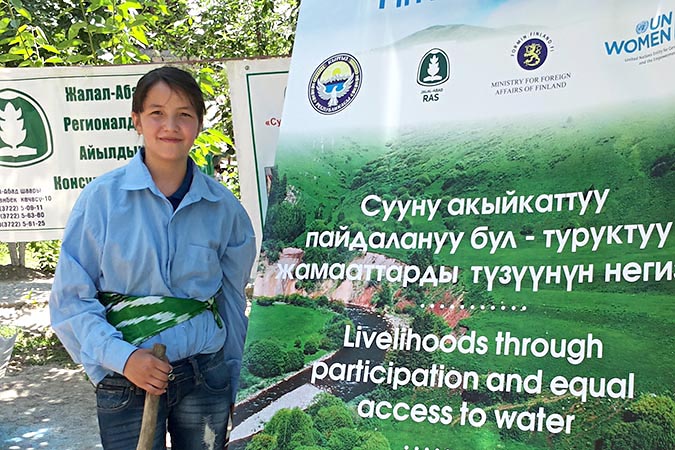From Where I Stand: “The voices of women and girls are completely absent in water management”
Date:
Dilera Mavlonova is only 16 years old, but she knows the importance of women’s leadership in water management. After learning advocacy skills through a UN Women programme, she and her peers raised awareness about women’s unequal burden to provide water for their homes in the village of Chek-Abad near the Kyrgyz-Uzbek border, where there is an unfolding water crisis. As a result, 124 women have joined local councils for water management, including in their executive bodies and committees that resolve conflicts over water. Before, there were only 13 women in these councils, and rarely in any decision-making roles.

“Every day while going to school, I see girls of my age, pregnant women and women with small kids carrying water. Collecting water eats up most of their time. Because of this arduous task, girls and young women miss out on many opportunities such as going to school, earning an income or enjoying leisure time. Their health also deteriorates as collecting water requires tremendous physical effort.
I decided to act, to empower women and support them in getting better access to water. Very few people recognize the burden of collecting women on women and girls.
At the beginning, it was really challenging for me to speak up for equal and fair access to natural resources and equal opportunities. I was brought up by my mother and grandparents in a conservative family and my grandparents didn’t want me to speak up and do advocacy in the community. However, the knowledge and advocacy skills I gained within “My Safe and Peaceful School” course made me strong.
People in the village listened to me and learned about the hardships women and girls face while fetching water over long distances. The responsibility for providing water falls disproportionately on women and girls as they have to wash, cook and clean for the family. But the voices of women and girls are completely absent in water management processes.
On World Water Day this year, I spoke to a large audience about the need for women to be included in water management. I called on women to serve on local water management committees and I called on men to invite more women to important meetings. Because, only women are aware of their own water burden and how it affects their health, personal development and the well-being of their families. Rural women’s lives can truly change if their water needs are addressed.”
With support from UN Women’s Livelihoods Through Participation and Equal Access to Water Project, funded by the Government Finland, 16-year-old Dilera Mavlonova and her peers raised awareness about improving women’s and girls’ access to water resources and women's leadership in water management. Her story relates to Sustainable Development Goal 6 on ensuring availability and sustainable management of water and sanitation for all and SDG 5, which promotes gender equality and calls for women's leadership and participation in all aspects of life.